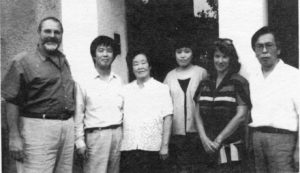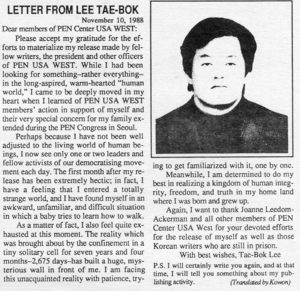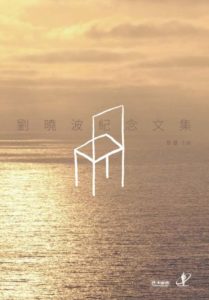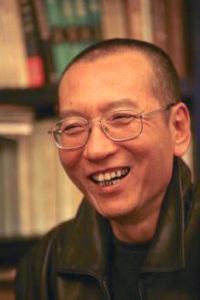Posts Tagged ‘PEN USA’
PEN Journey 1: Engagement
PEN International celebrates its Centenary in 2021. As Vice President Emeritus of PEN International and former International Secretary, former Chair of PEN International’s Writers in Prison Committee, former President of PEN Center USA West, board member and Vice President of PEN America and the PEN/Faulkner Foundation, I have been active in PEN for more than 30 years. With memories stirring and file drawers bulging with documents, I am a bit of a walking archive and have been asked by PEN International to write down some of the memories. I will try in digestible portions to recount moments, though I’m not certain how easily I can contain all these. I hope this personal PEN journey might be of some interest.
February 13, 1989: I was President of PEN Center USA West and on an airplane when I read that Salman Rushdie’s novel Satanic Verses was being burned in Birmingham. The next day a fatwa was issued on Rushdie. What was a fatwa, we all asked at the time, as we, along with PEN Centers around the world, mobilized to protest that a head of state was ordering the murder of a writer wherever he was in the world.
November 10, 1995: As Chair of PEN International’s Writers in Prison Committee, I was standing vigil with others outside the Nigerian Embassy in Washington, D.C. when word spread that novelist and activist Ken Saro Wiwa had been hanged that morning in Port Harcourt, Nigeria.
October 7, 2006: My phone rang at 7:30 on Saturday morning. I was International Secretary of PEN International, and the International Writers in Prison Program Director was calling to tell me that Anna Politkovskaya had just been shot and killed in Moscow. We all knew Anna—I’d last had coffee with her at an airport in Macedonia. We worked with her on the situation of writers in Russia and Chechnya and had enormous respect for her knowledge and courage.
January 19, 2007: We were about to begin a PEN International board meeting in Vienna when a call came from Istanbul. Hrant Dink had just been shot and killed outside his newspaper office in Istanbul. Dink was an editor of an Armenian paper and a writer whom members of PEN knew well and worked with on freedom of expression issues in Turkey.
Most writers long active in PEN’s freedom-to-write work can tell you where they were when the news broke on each of these cases. They can tell you because the lives of these writers and many others have been critical in the struggle for freedom of expression around the world.
In sharing memories of PEN, I begin with the writers and with the many friends around the globe who work on behalf of writers who don’t have the freedom to write without threat, imprisonment or death. As colleagues, we are bound together by the belief that truthful writing matters, be it journalism, fiction, poetry, drama, essays because stories and witnessing and creative imagination connect, inspire and shape us. Free expression is fundamental to a free society and is worth defending and expanding.

Salman Rushdie, Ken Saro Wiwa, Anna Politkovskaya, Hrant Dink
My own thirty plus years working with PEN began at a dinner meeting in Los Angeles in the early 1980’s. I was a young writer, new mother, former journalist who’d recently moved across the country from New York City where I taught writing at university and had friends and colleagues. I landed in the land of sun and Hollywood, and though I had a new college teaching job, I knew few people and even fewer writers. Like many who first seek out PEN, I came for the community.
My second meeting was at someone’s home where a presentation was made about writers in different parts of the world who were in prison because of their writing. I was introduced to PEN’s Writers in Prison Committee. At that meeting, we wrote postcards urging the Chinese government to release Wei Jingsheng, a writer who was imprisoned for “counterrevolutionary” activities, particularly for his essay “The Fifth Modernization” which he’d posted on the Democracy Wall in Beijing in 1978. His manifesto argued that as China was modernizing with four principles of modernization, it needed to include a fifth modernization–Democracy.
As I learned about Wei Jingsheng and the other writers on whose behalf PEN worked, I became more active in the PEN Center on the West Coast of America called PEN Los Angeles Center. I was elected President in 1988. Shortly after the election, I attended my second PEN International Congress in Seoul, South Korea right before the Olympics there. (The first Congress I attended was in 1986 in New York City, where our Center’s members were registered with the foreign delegates. I was active at that New York Congress in the Women’s revolution and the statement that came from the Congress.)
I arrived in Seoul late summer,1988 with our Center’s support for resolutions including one calling for the release of Wei Jingsheng and other writers in China, another resolution addressing writers in prison in South Korea, including our honorary member, publisher Lee Tae-Bok, and a resolution to change the name of PEN Los Angeles Center to PEN Center USA West. The name change had been passed by our center’s previous board but needed approval of the international Assembly of Delegates. It reflected our wider membership in the western part of the United States.
As president of PEN Los Angeles Center, I arrived as a young writer with a small delegation from Southern California, which included the former book editor of The Los Angeles Times and an English professor from UCLA. American PEN, based in New York, the largest of PEN’s more than 60 worldwide centers at the time was headed by Susan Sontag, president. American PEN didn’t want us to change our name and opposed our resolution on the floor of the Congress. While our two centers agreed on the other substantive issues of the Congress, including the problematic situation for writers in South Korea, and though we shared meals, the American PEN delegation, and Susan Sontag in particular, tried to get us to withdraw our name change, including a midnight call to me from Susan. The name change would be confusing, she said, and would take from the national scope of American PEN’s work. In that midnight call I listened to the arguments, then shared our thinking, which included the observation that our membership already came from many states west of the Mississippi, that in a country the size of the United States, PEN allowed more than one center, and for writers 3000 miles from New York, there was value in having more than one center of gravity. In the morning I presented American PEN’s arguments to my delegation, and we decided to go ahead and let our resolution go to the floor of the Assembly.
The representative from East Berlin noted: It would seem the East and West of America get along worse than the East and West of Germany. PEN Los Angeles Center’s resolution for a name change won by a wide margin, and we left the Congress as PEN Center USA West, which years later became PEN USA. I no longer live in Los Angeles but note that only in the past year –2018—did the members of the West Coast PEN decided to merge with PEN America in New York so there is now only one center of PEN in the US.
Most memorable and significant from the Seoul Congress was our delegation’s visit with the family of Lee Tae-Bok, our honorary member. “The house of Lee Tae-Bok’s parents is neat and spare, bedrooms with tatami mats on the floor, a living room with a sofa, a chair, a fish tank. There is no excess in the house, one senses out of choice. But there is an absence, not out of choice, for Lee Tae-Bok has been away in prison seven years. His mother worries that she will not see her oldest son out of prison before she dies,” I wrote in our Center’s newsletter. The family said that Lee Tae-Bok was in poor health and held in a cell four by five square meters, allowed out in the fresh air for only twenty minutes a day and wasn’t allowed to write except one letter a month to his family. His mother lamented the “hypocrisy” of the Korean government which had sentenced her son to life in prison because they said he published communist propaganda and yet they were greeting writers and “honored guests” at PEN’s Congress from Communist countries as well as inviting Eastern bloc athletes to Korea for the Olympic Games.

Digby Diehl and Joanne Leedom-Ackerman meet with the family of Lee Tae-Bok at the Lee home in Seoul in 1988.
In addition to our family visit, PEN Congress delegates petitioned the South Korean government on behalf of those in prison. A delegation from PEN International visited two of the writers in prison.
A few weeks after the Congress, notification reached us that Lee Tae-Bok had been released, though not everyone PEN spoke up for was released. I still remember where I was—I was in New York—when I heard the news, and I remember the elation. Many people worked on Lee Tae-Bok’s behalf so we couldn’t and didn’t take the credit, but we could feel some part of our actions, some push at the prison door helped spring it open. Release is not always the outcome for PEN’s work, but often it is. It is one of the goals. Over all my years in PEN, the release of a writer from prison still evokes a burst of hope and a measure of faith.

[Next installments: the watershed year 1988-1989 as the first global fatwa is issued against a writer, and writers and students in Tiananmen Square square off against China.]
Next Installment: PEN Journey 2: The Fatwa
Liu Xiaobo: On the Front Line of Ideas
Nobel Laureate Liu Xiaobo died this past July in prison, where he was serving an 11-year sentence for his role in drafting Charter ’08 calling for democratic reform in China. Below is my essay in The Memorial Collection for Dr. Liu Xiaobo, just published by the Institute for China’s Democratic Transition and Democratic China.

I never met Liu Xiaobo, but his words and life touch and inspire me. His ideas live beyond his physical body though I am among the many who wish he survived to help develop and lead democratic reform in China, a nation and people he was devoted to.
Liu’s Final Statement: I Have No Enemies delivered December 23, 2009 to the judge sentencing him stands beside important texts which inspire and help frame society as Martin Luther King’s Letter from a Birmingham Jail did in my country. King addressed fellow clergymen and also his prosecutors, judges and the citizens of America in its struggle to realize a more perfect democracy.
I hesitate to project too much onto Liu Xiaobo, this man I never met, but as a writer and an activist through PEN on behalf of writers whose words set the powers of state against them, I can offer my own context and measurement.
Liu said June, 1989 was a turning point in his life as he returned to China to join the protests of the democracy movement. In June, 1989 I was President of PEN Center USA West. It was a tumultuous year in which the fatwa against Salman Rushdie was issued in February, and PEN, including our center, mobilized worldwide in protest.
In May, 1989 I was a delegate to the PEN Congress in Maastricht, Netherlands where PEN Center USA West presented to the Assembly of Delegates a resolution on behalf of imprisoned writers in China, including Wei Jingsheng, and called on the Chinese government to release them. The Chinese delegation, which represented the government’s perspective more than PEN’s, argued against the resolution. Poet Bei Dao, who was a guest of the Congress, stood and defended our resolution with Taipei PEN translating.
When the events of Tiananmen Square erupted a few weeks later, my first concern was whether Bei Dao was safe. It turns out he had not yet returned to China and never did. PEN Center USA West, along with PEN Centers around the world, began going through the names of Chinese writers taken into custody so we might intervene. I remember well reading through these names written in Chinese sent from PEN’s London headquarters and trying to sort them and get them translated. Liu Xiaobo, I am certain must have been among them, though I didn’t know him at the time.
In his Final Statement to the Court twenty years later, Liu told the consequence for him of being found guilty of “the crime of spreading and inciting counterrevolution” at the Tiananmen protest: “I found myself separate from my beloved lectern and no longer able to publish my writing or give public talks inside China. Merely for expressing different political views and for joining a peaceful democracy movement, a teacher lost his right to teach, a writer lost his right to publish, and a public intellectual could no longer speak openly. Whether we view this as my own fate or as the fate of a China after thirty years of ‘reform and opening,’ it is truly a sad fate.”
I finally did meet Wei Jingsheng after years of working on his case. He was released and came to the United States where we shared a meal together at the Old Ebbit Grill in Washington. I was hopeful I might someday also get to meet Liu Xiaobo, or if not meet him physically, at least get to hear more from him through his poetry and prose.
His words are now our only meeting place. His writing is robust and full of truth about the human spirit, individually and collectively as citizens form the body politic. I expect that both his poetry and the famed Charter 08, for which he was one of the primary drafters and which more than 2000 Chinese citizens endorsed, will resonate and grow in consequence.
Charter 08 set out a path to a more democratic China which I hope one day will be realized.
“The political reality, which is plain for anyone to see, is that China has many laws but no rule of law; it has a constitution but no constitutional government,” noted Charter 08. “The ruling elite continues to cling to its authoritarian power and fights off any move toward political change….
“Accordingly, and in a spirit of this duty as responsible and constructive citizens, we offer the following recommendations on national governance, citizens’ rights, and social development: a New Constitution…Separation of Powers…Legislative Democracy…an Independent Judiciary…Public Control of Public Servants…Guarantee of Human Rights…Election of Public Officials…Rural—Urban Equality…Freedom to Form Groups…Freedom to Assemble…Freedom of Expression…Freedom of Religion…Civic Education…Protection of Private Property…Financial and Tax Reform…Social Security…Protection of the Environment…a Federated Republic…Truth in Reconciliation.”
Charter 08 addresses the body politic. Liu Xiaobo’s Final Statement: I Have No Hatred addresses the individual, and for me resonates most profoundly. Its call doesn’t depend on others but on oneself for execution. He warned against hatred.
“Hatred only eats away at a person’s intelligence and conscience, and an enemy mentality can poison the spirit of an entire people (as the experience of our country during the Mao era clearly shows). It can lead to cruel and lethal internecine combat, can destroy tolerance and human feeling within a society, and can block the progress of a nation toward freedom and democracy. For these reasons I hope that I can rise above my personal fate and contribute to the progress of our country and to changes in our society. I hope that I can answer the regime’s enmity with utmost benevolence, and can use love to dissipate hate.”
At a recent conference a participant asked if Liu Xiaobo might have changed this statement if he understood how his life would end. A friend who knew him assured that he would not for he was committed to the idea. Liu Xiaobo’s commitment to No Enemies, No Hatred does not accede to the authoritarianism he opposed, but instead resists the negative. He aligns with benevolence and love as the power that nourishes the human spirit and ultimately allows it to flourish. Liu’s words and his ideas lived offer us all a beacon and a guide.
